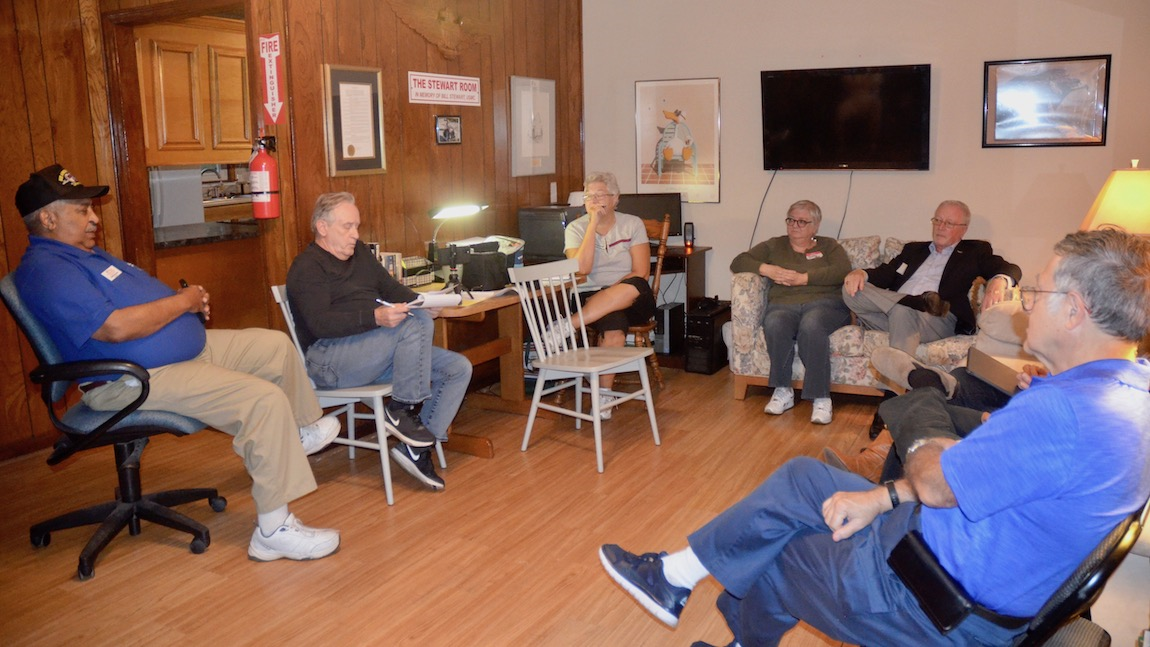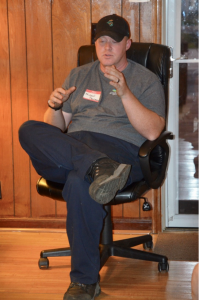Above Photo: Bob Gatty (2nd from left) and Susan Hutchinson interview veterans. To Gatty’s right is Keith Bacon. To Hutchinson’s left is Patty Hampton, Bruce Fisher and Richard Trout.
As part of HCDP’s effort to recognize and honor our veterans, to whom we all owe so much, we gathered 11 veterans together for a wide-ranging discussion on veterans’ concerns today. We are grateful to the Veterans Welcome Home and Resource Center in Little River, SC, which hosted the event and participated in the discussion. The interview was conducted by Bob Gatty and Susan Hutchinson of HCDP’s Communications Committee.
By Bob Gatty
All too often when our veterans, those men and women who have served our country, visit the Veterans Administration or other government agencies for help, red tape and bureaucratic requirements make it virtually impossible for them to obtain the timely assistance to which they are entitled.
Especially when it comes to applying for benefits, bureaucratic hassles were identified during our veterans interview as frustrating roadblocks that seem to prevent approvals for no apparent reason.
“Sometimes their claims get rejected, so they file an appeal, and then their appeals get rejected,” said Ron Wilson, the Veterans Welcome Home and Resource Center’s director. “A lot of times they get so frustrated that they just give up. Then, they come to see us.” Wilson served in Vietnam and was discharged from the Army as a Sergeant E-5 in 1972.
The Center is a 501c3 non-profit organization operated entirely by volunteers and financed by contributions. Its mission is to assist local honorably discharged veterans with job placement, filing claims with the VA, help with serious financial difficulties, and provide temporary shelter for those who need a safe place to stay.
It’s ironic, said Keith Bacon, the chairman of the Center’s Board of Directors, that “people on the (government agency’s) staff are paid to serve our vets, but they send people to an organization run by non-paid volunteers to resolve their problems.” Bacon served in Korea as an Army Captain.
Healthcare
Healthcare continues to be a major concern for many veterans, and those issues were a major part of the discussion among the veterans participating in the interview.
Susan Hayes Hatcher, a 20-year Air Force veteran who retired as a staff sergeant, discussed difficulties she experienced in coping with the Veterans Administration as she helped her ailing mother.
In July, she submitted paperwork for needed benefits, to which her mother as a widow of a veteran is entitled. In August, when she called to inquire as to the status, she was told she would not get an answer until July 2020. Then, in September she was told her answer would come in March.
“I said, ‘I don’t mean to be rude, but you know what, this is really ridiculous,’” she told the person at the VA. “This is a widow of a veteran. If you guys are taking this long on her paperwork, I think I need to submit my paperwork right now …so when my time comes due my paperwork will already be processed. I’m 60.”
“When you enlist, they guarantee your health care,” said Bacon. “So why isn’t the federal government in general taking care of these issues? The VA should follow individual veterans until they don’t need to be seen any more.”
Wilson told her to bring the paperwork in and the Center would help.
“I have a funny feeling that some of these people in these offices up there, in this magic kingdom where they are, are not even retired military. I think it’s just somebody they pulled in off the streets,” said Hatcher.
“My experience with the VA has been that the care is excellent – when it’s available,” said Dr. Bruce Fischer, a U.S. Army veteran who was a helicopter pilot in Vietnam.
Dealing with a dermatology issue, Fischer said when he went for care, a technician photographed the area in question, and then it took over a month to get a specialty appointment in Charleston for the needed treatment. Then, when Fischer asked for them to deal with another related issue while he was there, he was told, no, we can only do one issue at a time – which, of course, was frustrating.
Other veterans participating in the discussion, including Don Kohn, a retired Air Force sergeant who also served in Vietnam, and Michael Pearman, who served in the Army for eight years, including deployments in Iraq and Kuwait and is now a sergeant in the Army Reserves, said the care they received – and in Pearman’s case, is currently receiving – has been fine.
Patty Hampton, who was a medic in the Air Force in which she served for eight years, said she feels “really thankful to have VA benefits due to being a disabled vet.” However, she told about the time she needed to go to the VA hospital and was “transported in a police wagon that would have carried people to jail.” That, she said, was upsetting.
On another occasion, Hampton said, she was transported in an ambulance and kept receiving bills for the service for over a year because it took the VA so long to pay the ambulance company.
PTSD & Suicide
Nationwide, an average of 20 current and former military service members die by suicide each day. In South Carolina, veterans accounted for 16 percent of all suicides in 2017 when 120 veterans took their own lives. Still, according to the VA, only half of all veterans who need mental health services are receiving them.
Although retired and active military service members die by suicide at twice the rate of civilians, research shows that veterans who receive mental health care are much less likely to end their own lives than those who do not receive such care.
The big problem, according to Tracy Stecker, a psychologist at the Medical University of South Carolina’s School of Nursing is stigma associated with seeking mental health services, which she said many male veterans, especially, consider a sign of weakness.
The veterans who participated in our interview agreed. Mental health issues, including PTSD, need to be made a priority at the VA, where necessary care is often lacking.
Dr. Fischer, as a retired clinical psychologist, is experienced in treating veterans with PTSD, an important contributing factor in many veterans’ suicides.
“But it’s different when you’re on the receiving end,” he said during the interview, explaining that he had been undergoing treatment at the VA, but then the therapist retired and still has not been replaced. “They currently don’t have anybody who deals with PTSD,” he said.
Hatcher, a decorated 20-year Army veteran who retired as a warrant officer with a Purple Heart, was shot three times in Vietnam and still suffers from PTSD. At one point in his life, he said, “I didn’t understand what was happening to me. I was afraid that I would wake up at night and kill everybody in the house.”
In fact, said Hatcher, he experienced dreams that he was back in combat in Vietnam, he gave his rifle to his oldest son and told him, “If I come out that door acting crazy, kill me.”
His PTSD has lessened over the years, he said, adding that he attended group counseling sessions, which helped. “It’s better now than it used to be,” said Hatcher.
At the Center, veterans experiencing PTSD or possible suicide issues continue to seek help. “We know where to send them,” said Wilson. “Until the U.S. stops having veterans, it will be a continuing process,” he added.
Housing
For today’s veterans, and for many current service personnel, housing is a key issue.
According to the Housing Assistance Council, veterans constitute 10.1 percent of the state’s population, for a total of just under 374,000, with 7.1 percent living in poverty. Roughly 13 percent of homes in the state are occupied by veterans, who own about 79.6 percent of those homes with a median value of $150,000.
But, the Council reports that more than 55,000 of those homes experience one or more problems involving quality, crowding or cost, adding that 22 percent “pay too much” for their housing.
However, it was reported in July that current military personnel in South Carolina who live in base housing are experiencing rampant mold, exposed lead-based paint and many other issues in what is considered to be substandard housing. For some, it’s causing them to leave the military.
That’s a problem that Pearman said he and his family experienced when they lived at Fort Carson.
“If you’re not an E6 or above or an officer, your housing is pretty bad,” he said. “We had to set traps for rodents, and it was so cold that we had to wear layers in the house to keep warm. It’s not very good housing – especially if you’re an enlisted soldier.”
Then, there is the problem of homelessness among veterans. According to the Housing Assistance Council, there are approximately 480 homeless vets in the Palmetto State, a problem that comes to the doors of the Veterans Welcome Home and Resource Center.
All of these concerns are the day-to-day experiences of today’s veterans. It’s incumbent upon our government to address them. No veteran should experience problems in obtaining healthcare. No veteran should live in substandard housing. And no veteran should be forced to sleep in a car, or worse.
Addressing all of that should be a huge priority for government, from Washington, to Columbia, all the way down to the local level.
It’s just the right thing to do.
Veteran Michael Pearman Discusses Military Housing
For background information on the discussion attendees, please see HDCP Thanks Local Veterans for Discussion on VA Issues.
To read more about the veterans discussion on healthcare challenges, read Local Veterans Open Up About Healthcare Under the VA.
To see a video of the discussion please click here.
To learn more about the Veterans Welcome Home and Resource Center, click here for a video presentation.







